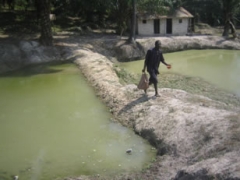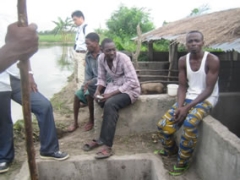- Home
- Countries & Regions
- Africa
- Benin
- Activities in Benin
- The Study on the Promotion of Inland Aquaculture for Rural Development
Activities in Benin
The Study on the Promotion of Inland Aquaculture for Rural Development
Background and Objective

The fishing industry in Benin provides employment for about 15% of the working population and is also a vital industry to the country as it provides 30% of the animal protein consumed by the populace. However, the production by domestic fisheries provides only 45,000 tons of products per year, about half of the consumption, with the gap being filled by imports. There is therefore a need to increase the productivity of domestic fisheries, which would curb the outflow of foreign currency and stimulate domestic producers.
The shoreline of Benin runs a mere 125 kilometers in width with a continental shelf reaching out only 20 to 30 kilometers. Lacking upwelling currents, which provide nutrients vital for seafood, Benin’s ocean territory is not favorable as a fishing ground. In contrast, however, rivers run some 700 kilometers through the central area of the country and 333 square meters of lagoons and lakes are interspersed around the country, providing productive fishing grounds. Of the 45,000 tons produced in the fishery industry per year, slightly less than 10,000 tons come from the sea, with the rest coming from inland bodies of water including that produced by aquaculture.
In Benin, 60% of the population lives in rural districts, which provide a less stable life than urban areas, and large disparities exist between the two areas. Given this situation, there is a large potential for development in Benin. The country has requested assistance with a development study that looks at developing villages through the promotion of inland aquaculture as a way to alleviate poverty.
- Total study expenses: Approximately 300 million yen
- Study period: April 2007 to March 2009
- Executing agency: The Ministry of Agriculture, Livestock and Fisheries
Project Summary

The study will be carried out across the entire country. It will include the formulation of a master plan and action plan for rural development that target the revitalization of inland aquaculture to improve the lives and livelihoods of the people. Initially, a pilot project will be launched to ensure the feasibility and practicality of the development plan and to increase the capacity of the central and regional government authorities as well as community organizations.
Project Highlights

Under this project, a master plan and an action plan will be formulated to ensure the lower rural socioeconomic class receives the benefits of the project. It is assured that benefits are allocated equally by both men and women, and efforts are made to promote the participation of women, who have a weaker status in farm villages and towns, in the plan formulation process. Upon reviewing aquaculture techniques, existing livestock and farming water sources are effectively used, and foreign fish seeds are not introduced. The needs of the poor, and gender equality and environmental issues are highly concerned in the project.

- Asia
- Oceania
- Latin America
- Africa
- Angola
- Benin
- Botswana
- Burkina Faso
- Burundi
- Cameroon
- Comoros
- Côte d'Ivoire
- Democratic Republic of the Congo
- Djibouti
- Eritrea
- Ethiopia
- Gabon
- Ghana
- Kenya
- Liberia
- Madagascar
- Malawi
- Mauritius
- Mozambique
- Namibia
- Niger
- Nigeria
- Rwanda
- Senegal
- Seychelles
- Sierra Leone
- Somalia
- South Africa
- South Sudan
- Sudan
- Tanzania
- Uganda
- Zambia
- Zimbabwe
- Middle East
- Europe
- About JICA
- News & Features
- Countries & Regions
- Our Work
- Thematic Issues
- Types of Assistance
- Partnerships with Other Development Partners
- Climate Change / Environmental and Social Considerations
- Evaluations
- Compliance and Anti-corruption
- Science and Technology Cooperation on Global Issues
- Research
- JICA Development Studies Program / JICA Chair
- Support for the Acceptance of Foreign HRs / Multicultural and Inclusive Community
- Publications
- Investor Relations
